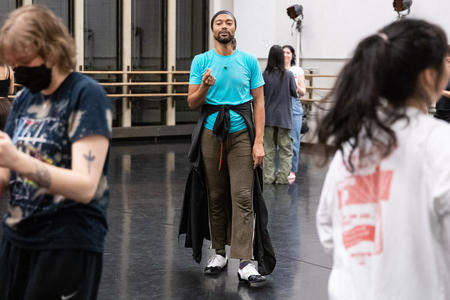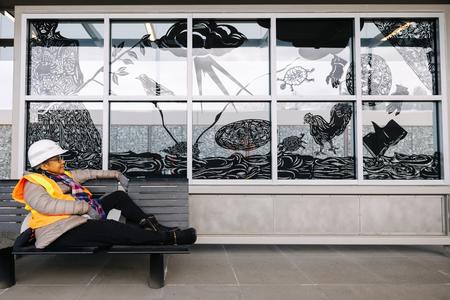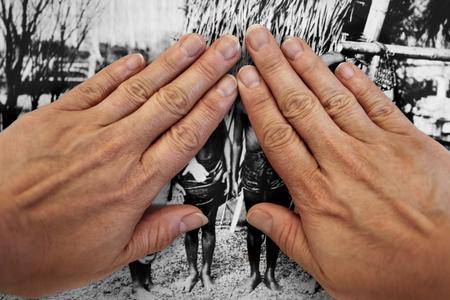Sidney Brustein is a well-meaning but flawed white liberal — and The Sign (at Capitol Hill’s Erickson Theatre, through Feb. 25) is a cutting but nuanced sociopolitical slice of life about the limits of liberal idealism and the pitfalls of compromise. Set in the 1960s bohemia of Greenwich Village, the play is being restaged as a timeless drama, co-produced by local theater companies Intiman Theatre and The Williams Project.
“One of the things that I’m really interested in, in this play, is this idea that the political is personal — or should be personal,” says Purcell, The Sign’s director and also The Williams Project’s artistic director.
Brustein is a Jewish intellectual and aging idealist who tries to live an alternative lifestyle — and prefers the artsy newspaper he publishes to “stay out of politics.” But the quandary presents itself when a (Black) friend tries to convince him to put a “reform” candidate’s campaign sign in his window and, further, to endorse the candidate in his newspaper.
For 2023 Seattleites, making the political personal leads to questions like: “What does it mean to live our values around racism, your own security, around homelessness?” Purcell says. “We think about liberals who are also NIMBYs; we think about liberals who are also tacitly on board with racism, misogyny, homophobia.”
In the early 1960s, those prejudices weren’t all that different or less insidious — and neither were the “polite liberals” Hansberry sketches in the play, suggests Purcell. Hansberry — who was Black — wrote and set The Sign in a tense moment, a historic turning point: while the civil rights movement was in full swing and a feminist movement was nascent, yet the activist, countercultural years of the 1960s hadn’t quite begun.
This production marks Seattle’s first professionally staged production of The Sign. Considered a lesser-known work that has long languished in the shadow of Hansberry’s award-winning debut A Raisin in the Sun (1957), the play has been rarely produced in the U.S. since it premiered on Broadway in 1964.
Back then, the play ran for about 90 days on Broadway, playing its final performance just days before Hansberry passed away at age 34 from cancer.
Sixty years later, Hansberry is having a moment, with three recent biographies and a prominent New York revival of Raisin in the Sun. The Sign is back in the zeitgeist, too. Just as Seattle’s revival premieres this week, a big-ticket version featuring movie and TV stars Rachel Brosnahan and Oscar Isaac debuts in New York City at the Brooklyn Academy of Music (through March 24).
So why now? “We’re in a moment where political radicalism seems less out-there than it did even a decade ago,” Purcell says while sitting in the mirrored rehearsal room where he and the team have spent the past few months. “There's a much louder chorus saying ‘Things are not working, we need to consider radical solutions. We need to consider tearing certain things down completely.’ In a moment like that, we look to radical writers.”
Hansberry was a radical author, not just as a playwright but also as a political writer for the left-leaning Pan-Africanist newspaper Freedom. She was staunchly socialist, feminist, anti-capitalist and anti-imperialist. The question of how to be a true revolutionary and whether to give up comfort for the struggle was at the front of her mind around the time she wrote The Sign, particularly as tensions between white liberals and Black activists in the civil rights movement mounted and opinions on civil disobedience diverged.
As Hansberry put it in a 1964 speech at a town-hall forum about tensions between Black and white activists in the civil rights movement: “We have to find some way with these dialogues to show and to encourage the white liberal to stop being a liberal and become an American radical.”
In a departure from A Raisin in the Sun, most characters in The Sign are white. But this production adds a notable twist: A Black actor is playing a character often cast as white, Wally O’Hara, the reform politician who ends up being corrupt.
The role is played by Anthony Holiday, an ebullient New York-based actor who’s only in his late twenties but who admits, with a chuckle, he always gets “aged up.” Today he’s dressed as the 40-something O’Hara, wearing a gray sweater with the collar of a pink shirt peeking out, and a black blazer on top. Holiday also plays the role of Max, the political radical, who sports a Kente-clothed pick in his hair and a bejeweled necklace of the continent of Africa.
Holiday says he took inspiration from Cornel West and Barack Obama for the role of O’Hara, and looked to Kanye West and Dr. Umar Johnson to shape Max.
It’s just one example of how this play resonates today, Holiday says. “I don't know that we even need to explain to the audience that this play was originally written in the 1960s,” he says. “Just watching, they'll be like: ‘Oh, what time are we in, is this now?’”
Like Brustein and most of the characters in this play, O’Hara is flawed — perhaps representing electoral politics and its limits. He turns out to be corrupt, in the pocket of the “mother party” he opposed. But The Sign is less a pointed finger than a humanist sketch of the slow, sputtering and sometimes imperceptible death of idealism. All the characters — Black and white, male, female — are flawed. There are no easy answers, and the faultlines seem to lie within rather than between people.
“This is an amazing play about: What does it take to be honest with yourself?” Purcell says. “What does it take to really see other people in all their complexity? What does it take to love people who are different from you without pretending they're not different? Great plays are timeless in that way.”
Get the latest in local arts and culture
This weekly newsletter brings arts news and cultural events straight to your inbox.








